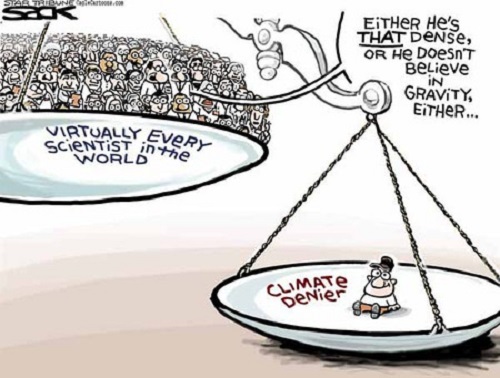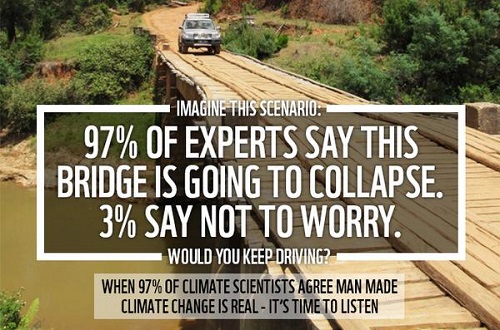2014 SkS Weekly Digest #34
Posted on 24 August 2014 by John Hartz
SkS Highlights
Dana's Global warming denial rears its ugly head around the world, in English drew the highest number of comments of the articles posted on SkS during the past week. Dikran Marsupial's 2014 Arctic Sea Ice Extent Prediction generated the second highest.
in his article, Climate Change Impacts in Labrador, Robert Way can be seen holding the Labrador flag during a field season studying glaciers in the beautiful Torngat Mountains National Park.
El Niño Watch
- ENSO: Recent Evolution, Current Status and Predictions NOAA, Aug 18, 2014
- Don’t dismiss a 2014 ‘super’ El Niño just yet by Agus Santoso, The Conversation, Aug 21, 2014
Toon of the Week

Quote of the Week
"We have found that, since 2009, the volume loss in Greenland has increased by a factor of about two, and the West Antarctic ice sheet by a factor of three," said glaciologist Angelika Humbert, one of the study's authors. "Both the West Antarctic ice sheet and the Antarctic peninsula, in the far west, are rapidly losing volume. By contrast, East Antarctica is gaining volume, though at a moderate rate that doesn't compensate for the losses on the other side of the continent."
'Incredible' rate of polar ice loss alarms scientists by Robin McKie, The Observer/The Guardian, Aug 23, 2014
SkS in the News
Quantifying the consensus on anthropogenic global warming in the scientific literature, Cook et al, 2013, Environmental Research Letters, is cited and linked to in Chris Mooney's Mother Jones article, Why Ignoring Global Warming Is Like Driving Across a Rickety Bridge. The tease line for Mooney's article is A viral tweet perfectly captures just how irresponsible climate denial is. The viral tweet was from the WWF UK and included the following graphic:

Michael J.L. Brown links to the SkS rebuttal article, What does past climate change tell us about global warming? in What I learned from debating science with trolls posted on The Convesation.
SkS Spotlights
In 2003, Global Footprint Network, a 501c (3) nonprofit organization, was established to enable a sustainable future where all people have the opportunity to live satisfying lives within the means of one planet.
An essential step in creating a one-planet future is measuring human impact on the Earth so we can make more informed choices.
That is why our work aims to accelerate the use of the Ecological Footprint — a resource accounting tool that measures how much nature we have, how much we use, and who uses what.
The Ecological Footprint is a data-driven metric that tells us how close we are to the goal of sustainable living. Footprint accounts work like bank statements, documenting whether we are living within our ecological budget or consuming nature’s resources faster than the planet can renew them.
Our efforts are fueled by a future vision in which human demand on nature is monitored as closely as the stock market. A time when designers are shaping products, buildings, and cities that have one-planet Footprints. A world where all humans prosper and development succeeds because we are finally recognizing ecological constraints and using innovation to advance more than just the economic bottom line.
Poster of the Week

SkS Week in Review
- 2014 SkS Weekly News Roundup #34B by John Hartz
- Ancient ocean currents may have changed pace and intensity of ice ages by NSF
- Scientist in focus – meteorologist and climate communicator Paul Huttner by John Abraham
- 2014 SkS Weekly News Roundup #34A by John Hartz
- Climate Change Impacts in Labrador by Robert Way
- 2014 Arctic Sea Ice Extent Prediction by Dikran Marsupial
- Global warming denial rears its ugly head around the world, in English by Dana
Coming Soon on SkS
- Unpacking unpaused global warming – climate models got it right (Dana)
- Athabasca Glacier: a tragic vanishing act (Andy Skuce)
- 2014 SkS Weekly News Roundup #35A (John Hartz)
- Guest Post (John Abraham)
- Climate Change: the Terminological Timeline (John Mason)
- What I learned from debating science with trolls (Michael J.L. Brown)
- 2014 SkS Weekly News Roundup #35B (John Hartz)































 Arguments
Arguments






























<snip>
[PS] Welcome to Skeptical science. Please read and thoroughly digest the comments policy. Note particularly, "Make comments in the most appropriate thread". No gish gallops like your one. "No sloganeering.".
Use the search function on the top left to find appropriate place to comment. Stick to topic and produce evidence to back your position. References to peer-reviewed literature are best.
If you just want a rant there are plenty of other sites which would welcome your comment. Stay here if you want to discuss actually the science.
sw @1... a) No, Christy merely pulled a fast one on you by improperly applying baselines. LINK
b) The models are not failing. LINK
sw @2... a) Engineers are not climate scientists. Next time you have an electrical problem in your home, are you going to call a plumber?
b) Religion is faith in something without any evidence. Climate change has 150 years of research and data behind it.
c) Mann's original graphs (MBH98/99) only go back to the MWP, not past it. You should actually read the paper. Or better, read any of the dozen papers that have been written on the same subject since 1999.
d) Why was Greenland green? When? 65 million years ago? 250 million years ago?
e) Christy again? Really?
f) Yes you are. I don't suspect any of these posts will survive the next hour.
[snip]
[RH] Please add substantive discussion to link related posts, per SkS policy.
I did not know of that rule. Safest not to link then.
José Duarte has written a piece on his blog personally and professionally attacking John and Dana. Parts of it have been reprinted in WUWT.
He attacks the rating methology and says that the 97% result was reliant on social science papers. It probably rises to the level of defamation. Will there be a reply?
[Rob P] - The comments policy prohibits "link only" comments. It is necessary to provide some discussion or context.
As for a reply - a quick scan reveals it to be a tinfoil hat-laced rant with no substance. Surely a self-professed polymath can crunch some numbers and come up with a solid estimate of how those few papers change the consensus figure of 97%?
And here's a rough guide - self-professed Econometrics expert, Richard Tol, carried out an 'analysis' of Cook et al (2013) that conjured up 300 rejection papers from thin air - more than three times the number of rejection papers found in the entire rating process - and yet the consensus figure only dropped to 91%.
Note also that the authors rated their own peer-reviewed research papers and came up with a 97% consensus.
I don't believe any reply is necessary, nor desirable.
Good-o. I have not been keeping abreast of the attacks on the Paper. I went on WUWT for the first time last week and found it stragely compelling. There is a patina of seriousness that qiuckly gives way to editorial promotion of stuff like this:
About Face! Why the World Needs More Carbon Dioxide
Yes it's a book. Check on Amazon if you don't believe me
The other thing I discovered from the site is that David Middleton is the ne plus ultra of carbon scientists.
Next week I'll be joining Nation Review Online's climate blog. For those who have not had the pleasure it's called Planet Gore. Sounds serious.